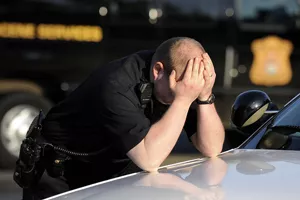
UTM grad speaks out about PTSD in first responders
The mental toughness that Kirsti Haaka needed to play Varsity Blues hockey continues to serve her well today as she copes with post-traumatic stress disorder (PTSD), a mental health condition that is triggered by experiencing or witnessing a terrifying event or events.
Haaka, who graduated from U of T Mississauga in 1994 with a B.Sc. in psychology, is both co-producer and on-screen presence in Code 9 -- Officer Needs Assistance, a new documentary film that addresses the impact of PTSD on first responders. As a law enforcement officer herself, Haaka knows how important it is to remove the stigma surrounding the disease so that others will speak up and get the help they need before despair leads to suicide.
“We’re trying to say that there is hope, that there are people who live with this diagnosis and are functional members of society,” Haaka said.
It’s a topic that has received more attention recently due to PTSD among veterans returning from Afghanistan and Iraq, but first responders are just as likely to be affected. The Tema Conter Memorial Trust, which tracks first responder suicides in Canada, reported that as of May 4, 2015, 17 first responders had committed suicide, along with five military personnel. In 2014, the numbers were 27 and 19, respectively.
Haaka, who also earned a diploma in law and security from Sheridan College and a master’s degree in criminal justice administration from Niagara University in Lewiston, New York, was in the midst of a thriving law enforcement career when PTSD struck. Unlike many of her peers, however, she sought help in understanding the nightmares and flashbacks that she began to experience.
“I felt alone and isolated and didn’t know what was happening,” Haaka said. “It crept up and I couldn’t cope. You didn’t discuss it; there was a suck-it-up mentality.”
She went to see her doctor and was diagnosed with PTSD, which has led to an extended leave of absence from her job. PTSD doesn’t magically disappear; like any mental illness, it requires treatment.
Haaka is undergoing therapy and, for the past year, she has had the support of Patty, a PTSD service dog. The chocolate Labrador retriever is her constant companion.
“I call her my lifeline,” Haaka said. “If something triggers flashbacks or nightmares, she can bring me out of it by barking, pawing or jumping up on me so my mind focuses on the present.”
When Haaka heard about the Code 9 Project on Facebook, she got involved immediately. The non-profit organization was established by Deborah Ortiz, the wife of a retired American police officer suffering from PTSD.
The documentary, Code 9 – Officer Needs Assistance, which won the Audience Choice Award at this year’s Tampa Bay Underground Film Festival, is designed to raise awareness about PTSD among first responders and to educate them and their administrators about the illness. There is also a self-help and responsive education program for first responders and their families.
The project was funded through contributions and Kickstarter campaigns, so the film has had limited release to date. However, Haaka will be in the audience at 2 p.m. on Dec. 17 for a screening and panel discussion at Niagara University that she arranged.
“Being part of this film was a big step for me,” said Haaka, “but it was something I had to do. I had to talk about it so other people can be helped.
“I went into policing so I could help others. I’m still helping them, just in a different way, and it feels empowering.”
